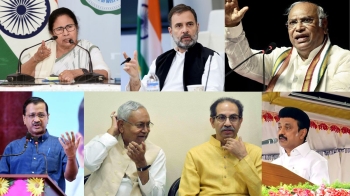
.png) Dr Suresh Mathew
Dr Suresh Mathew

Indian democracy is special in many ways. Whenever people realize that their hard-earned freedom and the constitutional rights are being snatched away, they rise in one voice; they prove their mettle; they come out to vote out the government that has shown the audacity to stray away from the democratic path.
We have seen it a few times in the past. Opposition parties, following the ruling party’s arrogance, had a couple of times come together to give a befitting reply to the government’s anti-people, oppressive measures. But, once in power, they have breached the trust people placed on them.
The governments formed by the Opposition parties have fallen without completing their terms. Fault lines caused by selfish motives of individuals and parties have cracked the unity, speeding up the down fall of the governments.
It is in this context the Patna meeting of 17 Opposition parties, held on June 23, has to be analysed. The nation is at the crossroads yet again, caused by the present regime and its policies, reportedly dictated by its mastermind.
Most Opposition parties and their leaders are at the receiving end of the government. The investigating agencies are after them for their deeds mostly when they were in power. They are not getting relief even from the courts as they wish. Sensing danger, the Opposition parties have now taken the first step in forming a united front; however, the road ahead is riddled with challenges. Going by the previous experiences, the unity often withers away once they are in power.
A look at the previous experiences gives enough hints at what ails the opposition unity and the causes for the downfall of their governments. The first such experiment was in 1977 when Morarji Desai government came to power after the defeat of Congress party led by Indira Gandhi. But it could not last for long; one of the main reasons for its downfall was the issue of dual loyalty of Jan Sangh members to the RSS, apart from Charan Singh’s ambition to ascent to the top slot.
Coming to the subsequent experiments of Opposition parties forming government, they too failed to last long mostly due to individual aspirations, though there were other reasons like the movement for Ram temple at Ayodhya.
Hence it is safe to conclude that any opposition experiment in forming a government at the Centre would succeed only if personal aspirations and ambitions of leaders are buried for the common good. The parties forming the coalition should focus on the common good of the people and the nation, rather than expansion of their parties or amassing money.
There are a few other barriers to surmount like agreeing on a single Opposition candidate against the ruling BJP in maximum number of Lok Sabha seats. This is possible if they can arrive at a state-wise seat sharing.
Equally important is a common manifesto detailing the policies and programmes of the government provided they win the elections. Their commitment to the sanctity of the Constitution and its values should be the guiding spirit. Once in power, they should not stray away from the ‘coalition dharma’. Hopefully, the parties that came together in Patna would learn from the past.